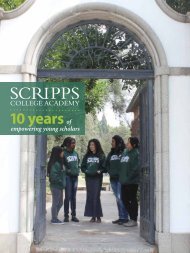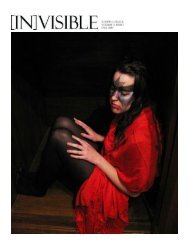“game over” yet: fantasizing - Scripps College Community
“game over” yet: fantasizing - Scripps College Community
“game over” yet: fantasizing - Scripps College Community
You also want an ePaper? Increase the reach of your titles
YUMPU automatically turns print PDFs into web optimized ePapers that Google loves.
Historical Perspective<br />
PUTTING GENDER IN THE VAGINA:<br />
THE VAGINA MONOLOGUES ON THE 5CS<br />
30 [in]Visible Magazine<br />
A feminist movement that uses<br />
theatre as its vessel for discussion is an<br />
exciting, fresh way to introduce people<br />
on the 5Cs, regardless of gender, to the<br />
importance of being comfortable in one’s<br />
own body. The V-Day Claremont Club’s<br />
production of The Vagina Monologues by<br />
Eve Ensler that will be performed this April<br />
strives to be this movement. The Vagina<br />
Monologues is a compilation of monologues<br />
that uniquely and diversely explore what it<br />
means to embrace womanhood. They strive<br />
to express the sufferings, accomplishments,<br />
fears, discoveries and celebrations of love<br />
that women experience. The V-Day Claremont<br />
club on the 5Cs has been hosting a<br />
performance of TVM for several years and<br />
this year, co-directors Angie Moore (PZ ’13)<br />
and Devin Grenley SCR’13 and co-producers<br />
Holly Underhill SCR ’13 and Sara Berge SCR<br />
’13 are celebrating and challenging what it<br />
means to be a woman.<br />
This production is first and foremost<br />
an opportunity to explore femininity<br />
and gender. “[T]his is about activism, not<br />
acting,” Sara Berge said. “We want to reach<br />
the masses, really impact the 5C community.”<br />
The producers first want to reach<br />
out to their cast and make the production<br />
experience memorable through empowerment.<br />
“It’s not just a show, it’s a movement,”<br />
said Angie Moore. The goal is to<br />
become “more empowered human beings<br />
in this process and realize the power of our<br />
own voice.” For this production, gender<br />
By Amy Borsuk<br />
identity is the lens through which the cast<br />
and crew will explore this power.<br />
“The history of TVM and feminism<br />
is a white, straight history,” Moore said.<br />
“Eve Ensler has outlets for breaking from<br />
that, but it feels more tokenizing [towards<br />
women of color, queer women].” As a result,<br />
the show limits not only its topics but<br />
its potential to be a wonderful opportunity<br />
for discussing feminist issues and empowering<br />
all women to be proud of their identity.<br />
This spring’s production of TVM aims to<br />
break from the traditional production of<br />
TVM that tokenizes and generalizes the<br />
image of “woman” by including a monologue<br />
for transwomen that intimately and<br />
poignantly reveals the pain and oppression<br />
transwomen face from a society that does<br />
“It’s not just a show, it’s a movement”<br />
not necessarily understand what it means<br />
to have a gender identity that is different<br />
from one’s biological sex.<br />
Including the transwoman’s monologue<br />
is a unique decision — one that I am<br />
particularly thrilled about. The concept of<br />
gender as an identity separate from sex is<br />
something that is complex and potentially<br />
frightening because it forces people to<br />
confront what it means to be a woman or a<br />
man not just in society, but for the individual.<br />
Through the oppression that transwomen<br />
have faced, we too are made to ask, “Why<br />
are we afraid of gender?” We are made to<br />
see gender as a form of identity that we<br />
can change by ourselves, and that powerful<br />
self-awareness and acceptance is beautiful.




